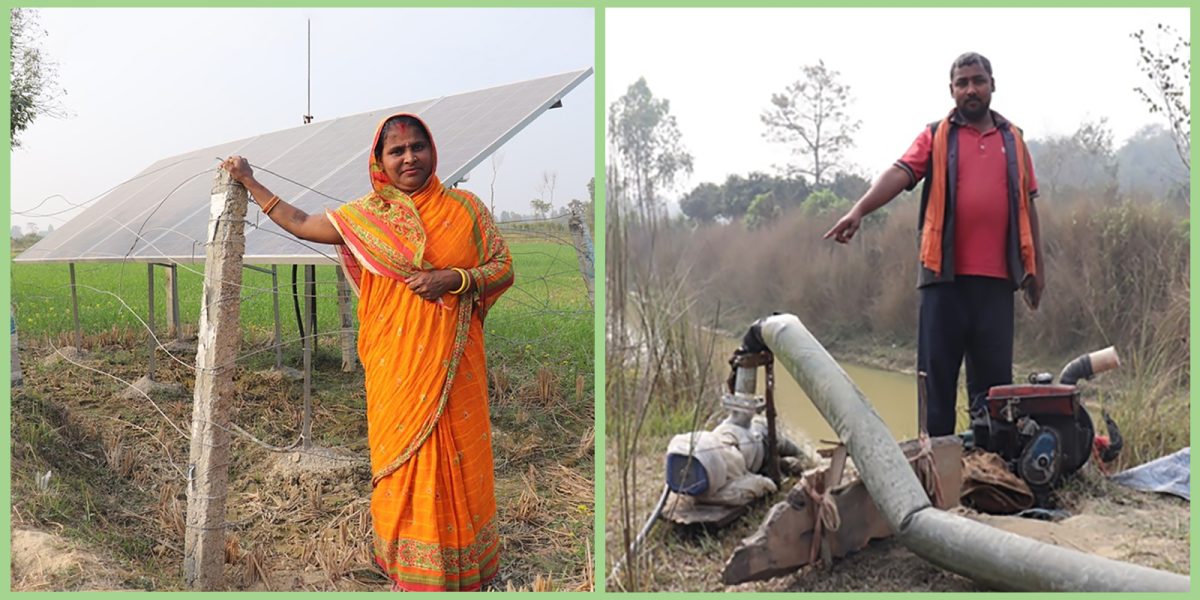Solar water pumps installed by farmers in Madhesh Province are helping them reduce cost of irrigation and are providing them with more water for irrigation and new avenues of income. Here are the stories of two such farmers.
Renu Devi Sah
Renu Devi Sah, 42, of Mithila Bihari Municipality in Dhanusha district is a mother of three children. She is a farmer and the sole caretaker of the family as her husband works away from home. The family relies largely on the income from farming and for over 20 years, she has been irrigating her 1.3 hectares of farmland with a diesel pump to grow wheat and paddy. The national electricity grid has not yet reached her locality.

Renu Devi Sah is all smiles because of her solar water pump
Renu Devi has had many bitter experiences while using a diesel water pump. It often broke down and starting it was difficult. “It required a lot of effort to start the diesel pump and I developed chest pains because of it,” she said. The operating cost of the diesel pump was also high. It consumed 25 liters of diesel per day, which cost NPR. 3,875 at the current price. Furthermore, she had to go to the market, which was a 30-minute bus ride on a bumpy road, to buy diesel and transporting it was also difficult.
Renu Devi replaced the diesel pump with a solar water pump a few months ago. “The solar pump has been a blessing! All I need to do now is turn on the switch.” said a beaming Shah, further adding, “My hard days of dealing with the annoying diesel water pump are gone”.
The solar water pump was provided to Renu Devi by Mero Microfinance through a project funded by the Sustainable Energy Challenge Fund (SECF). SECF is a challenge fund mechanism promoted by the Government of Nepal through the Alternative Energy Promotion Centre/ Central Renewable Energy Fund with technical assistance from the Nepal Renewable Energy Programme and financial support from the British Embassy in Kathmandu. SECF provides financial support to unviable or marginally viable projects with greater social impact to make them commercially viable.
Renu Devi came to know about solar water pumping from the branch manager of Mero Microfinance, in Dhanusha Dham. The manager guided her on how to obtain a microfinance loan and linked her to the local branch of Gham Power, a private company that installs solar PV systems including solar water pumps. She took a loan of NPR. 221,000 from Mero Microfinance with a three-year repayment period to install a 1.425 kilowatt solar water pumping system on her farm. Due to the implementation of the solar water pumping system, her total cost for supplying water to her fields is only around NPR. 265 per day.
Besides irrigating her own farm, she also provides water to eight other farmers who have adjoining farmlands. The standard rates to provide irrigation water is NPR. 300 per hour from grid electricity powered water pumps and NPR. 350 to 400 from diesel powered pumps. “As I have a solar pump, I charge only NPR. 200 per hour,” said Mrs. Shah. Now that she can pump water so cheaply, she has also started to grow vegetables such as cauliflower, cabbage, okra, brinjal and onion, among others on her farm in addition to the two major crops, providing her an additional revenue stream.
Jitendra Das
“Solar water pump has filled my life with new hope,” says Jitendra Das, 30, from Pidari in Janakpurdham Sub Metropolitan City. His wife runs a fish hatchery in Janakpur. They have three children, two sons and a daughter.

Jitendra Das points at his new solar water pump. Beside it lies the abandoned diesel pump.
Jitendra started a new fish hatchery project by leasing 1.5 hectares of land in Gonarpura village of Mahottari Rural Municipality in Mahottari district. He constructed three ponds on the land for the hatchery. “I want to provide fingerlings (baby fish) to farmers of this rural municipality,” he said. Gonarpura Rural Municipality does not have electricity supply from the national grid. Therefore, he started the project using a diesel water pump. But the fuel cost left him paralyzed. He had to spend NPR. 15,000 per month on diesel to pump water into the three ponds.
Like Renu Devi Sah, Jitendra got in touch with the branch Manager of Mero Microfinance of Janakpurdham Sub-Metropolitan City a few months ago and obtained a loan of NPR. 230,000 to install a 1.3-kilowatt peak solar water pump. He also obtained entrepreneurship training from them to prepare business plan through a project funded by the Sustainable Energy Challenge Fund (SECF). The branch manager connected him with Sunfarmer, a private company which provides solar PV systems including solar water pumps.
He will repay the system through monthly installments of NPR. 11,500 over three years. “This cost is much lower than the fuel cost to operate the diesel water pump,” said Jitendra. “The cost to operate my solar powered water pumping system comes to around NPR. 276 per day only.” Over the next 5 years, Jitendra will save about 60% of his expenses of water supply by switching to solar power compared to his diesel expenses.



